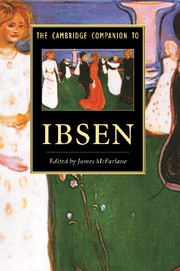Book contents
- Frontmatter
- 1 Ibsen's dramatic apprenticeship
- 2 Ibsen and historical drama
- 3 Dramatic and non-dramatic poetry
- 4 Ibsen and comedy
- 5 Ibsen and the realistic problem drama
- 6 Ibsen and feminism
- 7 The middle plays
- 8 The last plays
- 9 Ibsen's working methods
- 10 Ibsen and the theatre 1877-1900
- 11 Ibsen and the twentieth-century stage
- 12 Ibsen on film and television
- 13 On staging Ibsen
- 14 Ibsen and the drama of today
- 15 A century of Ibsen criticism
- 16 Works of reference
- Index
8 - The last plays
Published online by Cambridge University Press: 28 May 2006
- Frontmatter
- 1 Ibsen's dramatic apprenticeship
- 2 Ibsen and historical drama
- 3 Dramatic and non-dramatic poetry
- 4 Ibsen and comedy
- 5 Ibsen and the realistic problem drama
- 6 Ibsen and feminism
- 7 The middle plays
- 8 The last plays
- 9 Ibsen's working methods
- 10 Ibsen and the theatre 1877-1900
- 11 Ibsen and the twentieth-century stage
- 12 Ibsen on film and television
- 13 On staging Ibsen
- 14 Ibsen and the drama of today
- 15 A century of Ibsen criticism
- 16 Works of reference
- Index
Summary
Never had I more Excited, passionate, fantastical Imagination, nor an ear and eye That more expected the impossible
(W. B. Yeats, The Tower')'I have to keep working - creating one work after another - until the day I die.' When Ibsen gave these words to Arnold Rubek, to define what it means being an artist, he did not know, nor intend, that When We Dead Awaken was to be his last play - the Epilogue to the whole long row of 'one work after another' created over fifty years. To us the irony is twofold: Rubek is to die that very night, in his attempt to awaken, as a man and as an artist, from the 'dead'; Ibsen was to become too ill or frail to keep working until the day he died. For all that, Rubek's words may serve as a paradigm of the extraordinary drive which was an essential part of Ibsen's creativity, which had resulted in a regular output of 'contemporary' plays from Pillars of Society (1877) onwards, and which did not slacken when he returned to live in Norway in 1891, there to produce that series of plays which he somewhat grudgingly admitted to having had in mind when he used the term 'A Dramatic Epilogue': The Master Builder (1892), Little Eyolf (1894), John Gabriel Borkman (1896) and When We Dead Awaken (1899).
- Type
- Chapter
- Information
- The Cambridge Companion to Ibsen , pp. 126 - 154Publisher: Cambridge University PressPrint publication year: 1994
- 4
- Cited by

